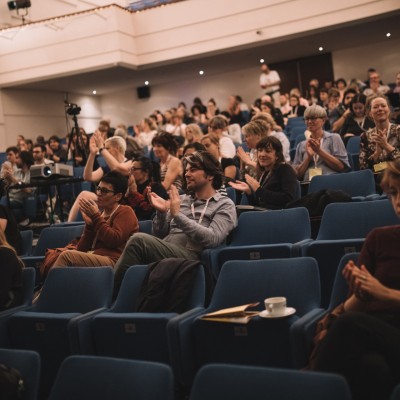
IETM Rijeka Plenary Meeting: videos
IETM Rijeka (24-27 October 2019) brought together over 330 performing arts professionals from all over the world to challenge the most common approaches and biases related to the theme of Audiences and create a space for finding new, truly relevant perspectives. The videos of the keynote speeches of the meeting are now available for on-demand viewing:
Opening keynote speech: Anti-production with Goran Sergej Pristas (BADco.)
Performing arts practices of today survive in a peculiar ecology thanks to the role given to various cultural institutions, whose mission is no longer to produce art but to reproduce a consumerist relation to work in art, whereby the artists grow less and less present through their artworks and more and more through their labour. What art institutions produce today are no longer works offered to public viewing and valorisation, but it is valorisation itself that is reproduced and exchanged. The many decades of care for the spectator – who went through every stage, from observer to participant, and then became an "emancipated spectator" – have resulted in the subjectivation of spectatorship. Whereas the producers spoke of “their artists”, the curators now talks of “their audience”. The audience is viewed as a model of the public, but what we see from stage is programmed spectatorship. Is it not high time to discuss the production of works, spectators and politics of watching?
Talk of the Day: For democratic cultural policies with Dea Vidović (Kultura Nova Foundation)
Cultural development is inherently linked with the qualification of so-called artistic excellence and artistic autonomy. At the same time, cultural participation is an inseparable part of cultural democracy. Thus, enhanced cultural participation without compromising the arts represents one of the most important challenges for democratic cultural policy. The recognition of cultural participation as a democratic form worthy of public attention and support in some cases has already provoked marginalisation and negligence of the issues related to the aesthetic and artistic values. At the same time, the requirement of inclusion of different social groups in arts has often been instrumentalised and resulted in the absence of change in power relations. To what degree are democratic forms maintained in cultural development? What kind of participation legitimises cultural democracy? At what point does cultural participation become entertainment and consumerism? How should the cultural policy utilitarian paradigm be changed, so that the implementation of cultural participation doesn’t slip into populism? How the 21st century cultural democracy should look like? This Talk of the Day will address these issues from the perspective of new and emerging initiatives for the redefinitions of democratic vitality, quality and accountability in cultural policy.
Talk of the Day: Cultural polis and the haunting spirit of the non-audience with Goran Tomka (Lecturer / Researcher)
On the 25th of May 1968, while the revolutionary fires of Paris were burning, hidden behind the doors of the Théâtre de la Cité de Villeurbanne, 23 directors of Maisons de la Culture and theatres signed a joint Villeurbanne Declaration. It stated that culture has become overly ’hereditary, individualist, bourgeois’, and it has created the 'non-public'. The spirit of the declaration has haunted cultural policies of Europe ever since. The far ones, invisibles, uncountables, the multitude - the ones who do not take part. It is not audiences, but their absent relatives, the ones who could not be understood, involved or included who are presenting the biggest disruption in the orderly polis of our culture. They are haunting our premiers, our posters, Facebook feeds and rehearsals; our hierarchies, aesthetics, salaries. And they are joining the spirits of the colonised and the displaced, of the burning forests, of precarious and wounded, of the extinct. They are calling for new ontologies, new politics and new culture. Will we pick up the phone?

